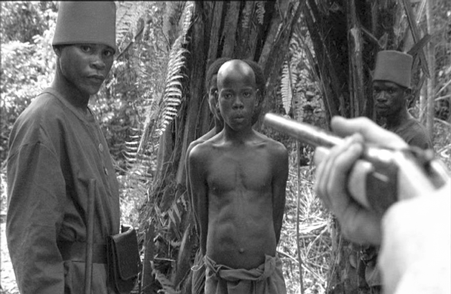By Jerry Tallmer
HOO, HOO, HOO
Listen to the yell of Leopold’s ghost
Burning in Hell for his hand-maimed host.
Hear how the demons chuckle and yell
Cutting his hands off, down in Hell.
Listen to the creepy proclamation
Blown through the lairs of the forest nation,
Blown past the white-ants’ hill of clay,
Blown past the marsh where the butterflies play –
“Be careful what you do,
Or Mumbo-Jumbo, God of the Congo,
And all the other
Gods of the Congo,
Mumbo-Jumbo will hoo-doo you …
– Vachel Lindsay, The Congo, 1879-81
Peter Bate knows that poem. In fact, he says, he has a recording of Vachel Lindsay reading it, and he thought about using it in his film, but for one reason or another he instead merely opened with photographs, taken by missionaries, of various black Congolese with hands and/or feet chopped off by the forces of King Leopold II of Belgium.
“Congo: White King, Red Rubber, Black Death,” Bate’s 84-minute documentary about the rubber-rich colonizing monarch at whose door can be laid the deaths of perhaps as many as 10 million human beings, opens Friday, October 21 for a week or more at the Quad Cinema on West 13th Street.
Atrocity stories abound: Women and children tied in a cross; men’s severed heads and genitals displayed on exhibit. The film equates Leopold II of Belgium (1835-1909) with Adolf Hitler. “Instead of being hanged,” a narrator declares, “Leopold was reinvented as a great civilizer.”
Hitler had the power of the state behind him, or in his grasp. When the Belgian government of Leopold’s time declined to acquire the Congo, Leopold simply (and outrageously) set about making that huge dark territory his own private and profitable domain.
We see the palaces and museums all over Belgium that were squeezed out of the blood (and rubber) of the Congo, the endless statues in Belgium and in Africa of Leopold astride one horse or another – and we see and hear the black man alive today who remembers when all black Congolese, if they passed such a statue, had to cross behind the horse’s rear. “He was our Big Boss,” another African says of Leopold. “Our uncle.”
Louis Michel, deputy prime minister and foreign minister of Belgium, attacked the film as “tendentious diatribe,” and its maker says the Belgian government and royal family “didn’t want it to be shown, but Belgium is still a democracy, so it was shown on Belgian TV in 2004 and 2005” as well as on two channels of the BBC and in many other countries around the world.
Bate and his crew spent two months in the Congo, mostly down near the Equator, after a year of research and consultation with Congolese historians, several of whom appear in the film. The scenes of Leopold’s court were reconstructed in a theater in Belgium, with a tall, gaunt Belgian actor named Elie Lison playing Leopold in a long white beard like Moses.
You learn, watching all this, interesting sidelights about Henry Morton Stanley, the explorer who charted the territory for Leopold; about Edmund Dene Morel, a British shipping clerk who, horrified by what he saw all around him in the Congo, started the world’s first civil-rights movement; and about Roger Casement, known in this country mostly for being hanged by the British as a pro-Irish, pro-German traitor to England during World War I, but who before that also brought the crimes of Leopold to the world’s attention.
Peter Bate, born in the North of England in 1946, came out of London University, apprenticed at the BBC, and then went off on his own. In 30 years he has made documentaries on a wide variety of subjects (the Enigma code, Henry VIII’s sunken flagship, role of the Catholic Church in the Rwanda genocide, American foreign policy, Charles Manson, Arab-Israeli relations).
“This one started when the BBC asked me to do something on Leopold. I had touched on the subject before. Now it just came around again, in thinking between the BBC and me.”
One person you will not find in this documentary is Patrice Lumumba, born 1925, first prime minister of the Democratic Republic of the Congo, murdered in January 1961 whether by the Belgians, by President Tschombe of Katanga, by the CIA, or by all three.
“The Congo is a very, very big country,” says Peter Bate, “with a big and convoluted history. If I’d wanted to make that film, I would have. I wanted to make this one.”
google_ad_client = “pub-6226499064891091”;
google_ad_width = 468;
google_ad_height = 60;
google_ad_format = “468x60_as”;
google_ad_channel =”0606561524″;
google_color_border = “336699”;
google_color_bg = “FFFFFF”;
google_color_link = “0000FF”;
google_color_url = “008000”;
google_color_text = “000000”;
//–>
src=”https://pagead2.googlesyndication.com/pagead/show_ads.js”>
WWW Downtown Express


































